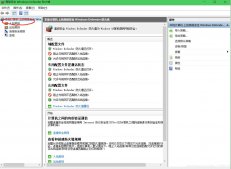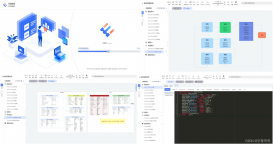概述
分布式数仓应用场景中,我们经常遇到数据库系统 hang 住的问题,所谓 hang 是指虽然数据库系统还在运行,但部分或全部业务无法正常执行。hang 问题的原因有很多,其中以分布式死锁最为常见,本次主要分享在碰到死锁时,如何快速地解决死锁问题。
gaussdb(dws) 作为分布式数仓,通过锁机制来实行并发控制,因此也存在产生分布式死锁的可能。虽然分布式死锁无法避免,但幸运的是其提供了多种系统视图,能够保证在分布式死锁发生之后,快速地对死锁进行定位。
本文主要介绍了在 gaussdb(dws) 中,如何通过 sql 语句,对分布式死锁进行检测和恢复。本文介绍的方法大致分为 4 步:
1. 收集各节点的锁信息。
2. 构建等待关系。
3. 检测循环等待。
4. 中止事务以消除死锁。
本文介绍的方法使用简单,门槛低,可以确保在分布式死锁发生之后,快速解决问题,恢复业务。
分布式死锁和单节点死锁的比较单节点死锁
单节点死锁是指,死锁中的所有锁等待信息来自同一个节点,例如:
|
1
2
3
4
5
6
7
8
9
10
11
12
13
14
15
16
17
18
19
20
|
-- 事务 transaction1-- 所在节点:cn1begin;truncate t1;execute direct on(dn1) 'select * from t2';commit;-- 事务 transaction2-- 所在节点:cn1begin;truncate t2;execute direct on(dn2) 'select * from t1';commit; |
假设上述两个事务的执行顺序如下:
1. [transaction1] truncate t1
2. [transaction2] truncate t2
3. [transaction1] execute direct on(dn1) 'select * from t2'
4. [transaction2] execute direct on(dn2) 'select * from t1'
该执行顺序会导致死锁的产生。由于事务 transaction1 和 transaction2 都在 cn1 上执行,死锁中的所有锁等待信息都在 cn1 上,因此该死锁为单节点死锁。

gaussdb(dws) 支持自动处理单节点死锁。当某个节点上的多个事务陷入循环等待时,数据库系统会自动将其中一个事务中止,从而消除死锁。

分布式死锁
分布式死锁是指,死锁中的锁等待信息来自不同节点。例如:
|
1
2
3
4
5
6
7
8
9
10
11
12
13
14
15
16
17
18
19
20
|
-- 事务 transaction1-- 所在节点:cn1begin;truncate t1;execute direct on(dn1) 'select * from t2';commit;-- 事务 transaction2-- 所在节点:cn2begin;truncate t2;execute direct on(dn2) 'select * from t1';commit; |
本例与上一节中的例子相比,只有事务 transaction2 的所在节点从 cn1 改为了 cn2。
假设两个事务的执行顺序和上一节中的执行顺序一致,还是会产生死锁,死锁中的锁等待信息如下:

这就是一个典型的分布式死锁,单独看 cn1 或 cn2 上的锁等待信息,都看不出来有死锁,但将多个节点的锁等待信息放到一起看,就能找到有循环等待的现象。
发生分布式死锁时,陷入死锁的事务全部都无法继续执行下去,只有其中一个事务锁等待超时,剩余事务才能继续执行。默认情况下,锁等待超时时间是 20 分钟。

分布式死锁的检测与消除
当我们观察到数据库系统出现 hang 问题时,我们需要通过 sql 语句检测分布式死锁,如果发现确实存在分布式死锁,还需要对死锁进行消除。接下来以之前的分布式死锁为例,介绍分布式死锁的检测和消除的方法。
收集各节点的锁信息
为了检测分布式死锁,首先需要获得各节点的锁信息。gaussdb(dws) 中可以通过 pg_locks 视图查询当前节点的锁信息,因此可以通过 execute direct 语句在所有节点查询 pg_locks 视图,并收集到当前节点中。
注意此处有一个细节,pg_locks 视图中,很多信息是以 oid 类型给出的,例如一个锁加在一个表上,pg_locks 视图会给出表的 oid。由于同一个表在各节点中的 oid 不一定相同,因此不能通过 oid 来标识一个表。在收集锁信息时,需要先将表的 oid 转换成 schema 名加表名。其它 oid 信息例如分区 oid 等也同理,需要转化为对应的名字。
执行附件中的示例代码 pgxc_locks.sql,就可以收集到各节点的锁信息:
|
1
2
3
4
5
6
7
8
9
10
11
12
13
14
15
16
17
18
19
20
21
22
23
|
locktype | nodename | datname | usename | nspname | relname | partname | page | tuple | virtualxid | transactionid | virtualtransaction | mode | granted | client_addr | application_name | pid | xact_start | query_start | state | query_id | query---------------+--------------+----------+---------+---------+---------+----------+------+-------+------------+---------------+--------------------+---------------------+---------+-------------+------------------+-----------------+----------------------------+----------------------------+---------------------+-------------------+----------------------------------------------------- virtualxid | cn_5002 | postgres | tyx_1 | | | | | | 12/94 | | 12/94 | exclusivelock | t | | gsql | 140110481323776 | 2020-12-25 17:18:54.238933 | 2020-12-25 17:19:37.715447 | active | 0 | execute direct on(dn_6003_6004) 'select * from t1'; virtualxid | cn_5002 | postgres | tyx_1 | | | | | | 9/298 | | 9/298 | exclusivelock | t | ::1/128 | cn_5001 | 140110672164608 | 2020-12-25 17:18:40.478704 | 2020-12-25 17:18:40.479682 | idle in transaction | 0 | truncate t1; virtualxid | cn_5002 | postgres | tyx_1 | | | | | | 6/161 | | 6/161 | exclusivelock | t | | wlmarbiter | 140110762325760 | 2020-12-25 17:20:18.613815 | 2020-12-25 16:53:35.027585 | active | 0 | wlm arbiter sync info by ccn and cns virtualxid | cn_5002 | postgres | tyx_1 | | | | | | 5/162 | | 5/162 | exclusivelock | t | | workloadmonitor | 140110779119360 | 2020-12-25 17:20:27.16458 | 2020-12-25 16:53:35.027217 | active | 0 | wlm monitor update and verify local info virtualxid | cn_5002 | postgres | tyx_1 | | | | | | 3/325 | | 3/325 | exclusivelock | t | | workload | 140110846744320 | 2020-12-25 17:20:25.372654 | 2020-12-25 16:53:35.02741 | active | 72339069014641297 | wlm fetch collect info from data nodes advisory | cn_5002 | postgres | tyx_1 | | | | | | | | 12/94 | sharelock | t | | gsql | 140110481323776 | 2020-12-25 17:18:54.238933 | 2020-12-25 17:19:37.715447 | active | 0 | execute direct on(dn_6003_6004) 'select * from t1'; relation | cn_5002 | postgres | tyx_1 | public | t1 | | | | | | 9/298 | accessexclusivelock | t | ::1/128 | cn_5001 | 140110672164608 | 2020-12-25 17:18:40.478704 | 2020-12-25 17:18:40.479682 | idle in transaction | 0 | truncate t1; relation | cn_5002 | postgres | tyx_1 | public | t1 | | | | | | 12/94 | accesssharelock | f | | gsql | 140110481323776 | 2020-12-25 17:18:54.238933 | 2020-12-25 17:19:37.715447 | active | 0 | execute direct on(dn_6003_6004) 'select * from t1'; transactionid | cn_5002 | postgres | tyx_1 | | | | | | | 10269 | 12/94 | exclusivelock | t | | gsql | 140110481323776 | 2020-12-25 17:18:54.238933 | 2020-12-25 17:19:37.715447 | active | 0 | execute direct on(dn_6003_6004) 'select * from t1'; transactionid | cn_5002 | postgres | tyx_1 | | | | | | | 10266 | 9/298 | exclusivelock | t | ::1/128 | cn_5001 | 140110672164608 | 2020-12-25 17:18:40.478704 | 2020-12-25 17:18:40.479682 | idle in transaction | 0 | truncate t1; relation | cn_5002 | postgres | tyx_1 | public | t2 | | | | | | 12/94 | accessexclusivelock | t | | gsql | 140110481323776 | 2020-12-25 17:18:54.238933 | 2020-12-25 17:19:37.715447 | active | 0 | execute direct on(dn_6003_6004) 'select * from t1'; virtualxid | dn_6001_6002 | postgres | tyx_1 | | | | | | 17/433 | | 17/433 | exclusivelock | t | ::1/128 | cn_5001 | 140552375822080 | 2020-12-25 17:18:40.478704 | 2020-12-25 17:18:50.513948 | idle in transaction | 0 | truncate t1; virtualxid | dn_6001_6002 | postgres | tyx_1 | | | | | | 23/692 | | 23/692 | exclusivelock | t | ::1/128 | cn_5002 | 140552359040768 | 2020-12-25 17:18:54.238933 | 2020-12-25 17:18:56.830053 | idle in transaction | 0 | truncate t2; virtualxid | dn_6001_6002 | postgres | tyx_1 | | | | | | 2/1607 | | 2/1607 | exclusivelock | t | | workload | 140552945264384 | | 2020-12-25 16:53:35.041283 | active | 0 | wlm fetch collect info from data nodes transactionid | dn_6001_6002 | postgres | tyx_1 | | | | | | | 10266 | 17/433 | exclusivelock | t | ::1/128 | cn_5001 | 140552375822080 | 2020-12-25 17:18:40.478704 | 2020-12-25 17:18:50.513948 | idle in transaction | 0 | truncate t1; relation | dn_6001_6002 | postgres | tyx_1 | | | | | | | | 23/692 | accessexclusivelock | t | ::1/128 | cn_5002 | 140552359040768 | 2020-12-25 17:18:54.238933 | 2020-12-25 17:18:56.830053 | idle in transaction | 0 | truncate t2; relation | dn_6001_6002 | postgres | tyx_1 | | | | | | | | 17/433 | accessexclusivelock | t | ::1/128 | cn_5001 | 140552375822080 | 2020-12-25 17:18:40.478704 | 2020-12-25 17:18:50.513948 | idle in transaction | 0 | truncate t1; relation | dn_6001_6002 | postgres | tyx_1 | public | t2 | | | | | | 23/692 | sharelock | t | ::1/128 | cn_5002 | 140552359040768 | 2020-12-25 17:18:54.238933 | 2020-12-25 17:18:56.830053 | idle in transaction | 0 | truncate t2; relation | dn_6001_6002 | postgres | tyx_1 | public | t2 | | | | | | 23/692 | accessexclusivelock | t | ::1/128 | cn_5002 | 140552359040768 | 2020-12-25 17:18:54.238933 | 2020-12-25 17:18:56.830053 | idle in transaction | 0 | truncate t2;省略若干行(55 rows) |
构建等待关系
收集到各节点的锁信息之后,就可以开始构建等待关系了。
事务 a 等待事务 b,需要满足 3 个条件:
1. 两个事务加锁的资源相同(同一个表、同一个分区、同一个页面或同一个元组等)。特别注意,如果事务 a 对 dn1 的 t1 表的加锁,事务 b 对 dn2 的 t1 表的加锁,则我们认为它们加锁的资源不同,只有同一节点上的同一资源才被认为是相同的资源。
2. 事务 b 已经持有锁,而事务 a 还未持有锁。
3. 事务 a 和事务 b 申请的锁的级别互斥。
通过对上一步收集到的锁信息进行处理,就可以构建出事务的等待关系。
执行附件中的示例代码 pgxc_locks_wait.sql,就可以获得等待关系:
|
1
2
3
4
5
6
7
8
9
10
11
12
13
14
15
16
17
18
19
20
21
22
23
24
25
26
27
28
29
30
31
32
33
34
35
36
37
38
39
|
locktype | nodename | datname | acquire_lock_pid | hold_lock_pid | acquire_lock_event | hold_lock_event----------+----------+----------+------------------+-----------------+-------------------------------------------------------------------------+-------------------------------------------------------- relation | cn_5001 | postgres | 140508814374656 | 140508792350464 | usename : tyx_1 +| usename : tyx_1 + | | | | | nspname : public +| nspname : public + | | | | | relname : t2 +| relname : t2 + | | | | | partname : +| partname : + | | | | | page : +| page : + | | | | | tuple : +| tuple : + | | | | | virtualxid : +| virtualxid : + | | | | | transactionid : +| transactionid : + | | | | | virtualtransaction: 11/13 +| virtualtransaction: 12/1323 + | | | | | mode : accesssharelock +| mode : accessexclusivelock + | | | | | client_addr : +| client_addr : ::1/128 + | | | | | application_name : gsql +| application_name : cn_5002 + | | | | | xact_start : 2020-12-25 17:18:40.478704 +| xact_start : 2020-12-25 17:18:54.238933 + | | | | | query_start : 2020-12-25 17:19:23.0923 +| query_start : 2020-12-25 17:18:54.239319 + | | | | | state : active +| state : idle in transaction + | | | | | query_id : 0 +| query_id : 0 + | | | | | query : execute direct on(dn_6001_6002) 'select * from t2';+| query : truncate t2; + | | | | | ------------------------------------------------------ | ------------------------------------------------------ relation | cn_5002 | postgres | 140110481323776 | 140110672164608 | usename : tyx_1 +| usename : tyx_1 + | | | | | nspname : public +| nspname : public + | | | | | relname : t1 +| relname : t1 + | | | | | partname : +| partname : + | | | | | page : +| page : + | | | | | tuple : +| tuple : + | | | | | virtualxid : +| virtualxid : + | | | | | transactionid : +| transactionid : + | | | | | virtualtransaction: 12/94 +| virtualtransaction: 9/298 + | | | | | mode : accesssharelock +| mode : accessexclusivelock + | | | | | client_addr : +| client_addr : ::1/128 + | | | | | application_name : gsql +| application_name : cn_5001 + | | | | | xact_start : 2020-12-25 17:18:54.238933 +| xact_start : 2020-12-25 17:18:40.478704 + | | | | | query_start : 2020-12-25 17:19:37.715447 +| query_start : 2020-12-25 17:18:40.479682 + | | | | | state : active +| state : idle in transaction + | | | | | query_id : 0 +| query_id : 0 + | | | | | query : execute direct on(dn_6003_6004) 'select * from t1';+| query : truncate t1; + | | | | | ------------------------------------------------------ | ------------------------------------------------------(2 rows) |
等待关系判环
构建出事务的等待关系之后,就可以通过检查等待关系是否成环,来判断当前是否有分布式死锁。
一般情况下,等待关系不会太多,通过观察就可以判断出当前有无分布式死锁。通过观察上一节中构建的等待信息,可以很容易地判断出事务 transaction1 和 transaction2 发生了循环等待,即产生了死锁。
消除死锁
上一步最终可能会找到等待关系中的一个或多个环,对于每个环,需要中止环中的一个事务,才能消除死锁。至于应该选择环中的哪个事务进行中止,需要我们从事务的重要性、已执行时间等多方面进行考虑,最终选择一个对业务影响最小的事务进行中止。
总结
通过 sql 语句,我们可以很方便地处理分布式死锁。当我们在实际业务中遇到数据库系统 hang 住的问题时,可以借助本文提供的方法,检查 hang 问题是否是分布式死锁引起的,如果问题确实是由分布式死锁引起的,还可以通过中止某个陷入死锁的事务,来快速恢复业务。
以上就是详解通过sql进行分布式死锁的检测与消除的详细内容,更多关于通过sql进行分布式死锁的检测与消除的资料请关注服务器之家其它相关文章!
原文链接:https://www.cnblogs.com/huaweiyun/p/14214901.html















